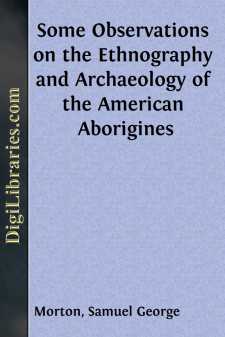Non-Classifiable
- Non-Classifiable 1768
Non-Classifiable Books
Sort by:
I. SOME CHARACTERISTICS OF MEDAEVAL THOUGHT IN the earliest days of his upward evolution man was satisfied with a very crude explanation of natural phenomena—that to which the name "animism" has been given. In this stage of mental development all the various forces of Nature are personified: the rushing torrent, the devastating fire, the wind rustling the forest leaves—in the mind of the...
more...
ANGELS COULDN'T SWEAR IT RIGHT. The President was once speaking about an attack made on him by the Congressional Committee on the Conduct of the War for a certain alleged blunder in the Southwest—the matter involved being one which had fallen directly under the observation of the army officer to whom he was talking, who possessed official evidence completely upsetting all the conclusions of the...
more...
by:
John Morley
I ON PRESENTING THE INDIAN BUDGET (HOUSE OF COMMONS. JUNE 6, 1907) I am afraid I shall have to ask the House for rather a large draft upon its indulgence. The Indian Secretary is like the aloe, that blooms once in 100 years: he only troubles the House with speeches of his own once in twelve months. There are several topics which the House will expect me to say something about, and of these are two or...
more...
by:
Anonymous
PREFACE. Peter Piper, without Pretension to Precocity or Profoundness, Puts Pen to Paper to Produce these Puzzling Pages, Purposely to Please the Palates of Pretty Prattling Playfellows, Proudly Presuming that with Proper Penetration it will Probably, and Perhaps Positively, Prove a Peculiarly Pleasant and Profitable Path to Proper, Plain and Precise Pronunciation. He Prays Parents to Purchase this...
more...
CHAPTER I.THE PURPOSE OF THIS BOOK This book is written for the purpose of giving our clients some ideas of the fundamental principles that guide us when we select stocks for them to buy, but these principles are valuable to every person who trades in listed stocks or in any other kind of speculative stocks. First of all, we want you to get a clear conception of the meaning of the word speculation,...
more...
Nothing in the progress of human knowledge is more remarkable than the recent discoveries in American archæology, whether we regard them as monuments of art or as contributions to science. The names of Stephens and Norman will ever stand preëminent for their extraordinary revelations in Mexico and Yucatan; which, added to those previously made by Del Rio, Humboldt, Waldeck and D’Orbigny in these...
more...
CHAPTER I: EAST ANGLIA It is a trite saying, the truth of which is so universally admitted that it is hardly worth repeating, that a man’s memory, above all things, retains most vividly recollections of the scenes amidst which he passed his early days. Amidst the loneliness of the African veldt or American prairie solitudes, the West-countryman dreams of Devon’s grassy tors and honeysuckle lanes,...
more...
PART I.—INTRODUCTORY AND HISTORICAL. Section 1.—Origin and Scope of Inquiry. A perusal of departmental files reveals that many persons and bodies have during recent times urged upon the Government the desirability of setting up a Committee or Commission of Inquiry to go into this subject. The appointment of the present Committee, however, arose out of a suggestion forwarded to the Chairman of the...
more...
CHAPTER I. INTRODUCTORY. Assaying has for its object the determination of the quantities of those constituents of a material which add to or detract from its value in the arts and manufactures. The methods of assaying are mainly those of analytical chemistry, and are limited by various practical considerations to the determination of the constituents of a small parcel, which is frequently only a few...
more...
by:
August Bebel
Bebel's work, "Die Frau und der Socialismus," rendered in this English version with the title "Woman under Socialism," is the best-aimed shot at the existing social system, both strategically and tactically considered. It is wise tactics and strategy to attack an enemy on his weakest side. The Woman Question is the weakest link in the capitalist mail. The workingman, we know, is a...
more...











